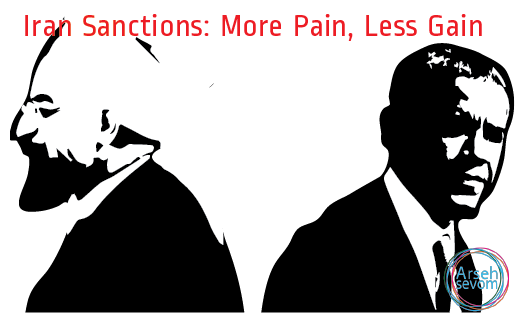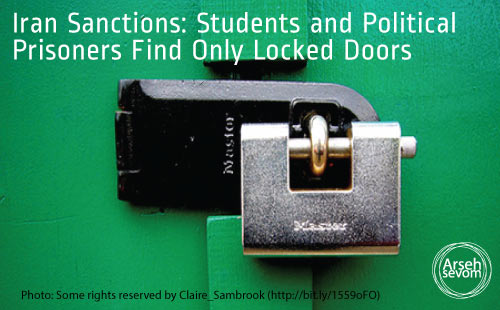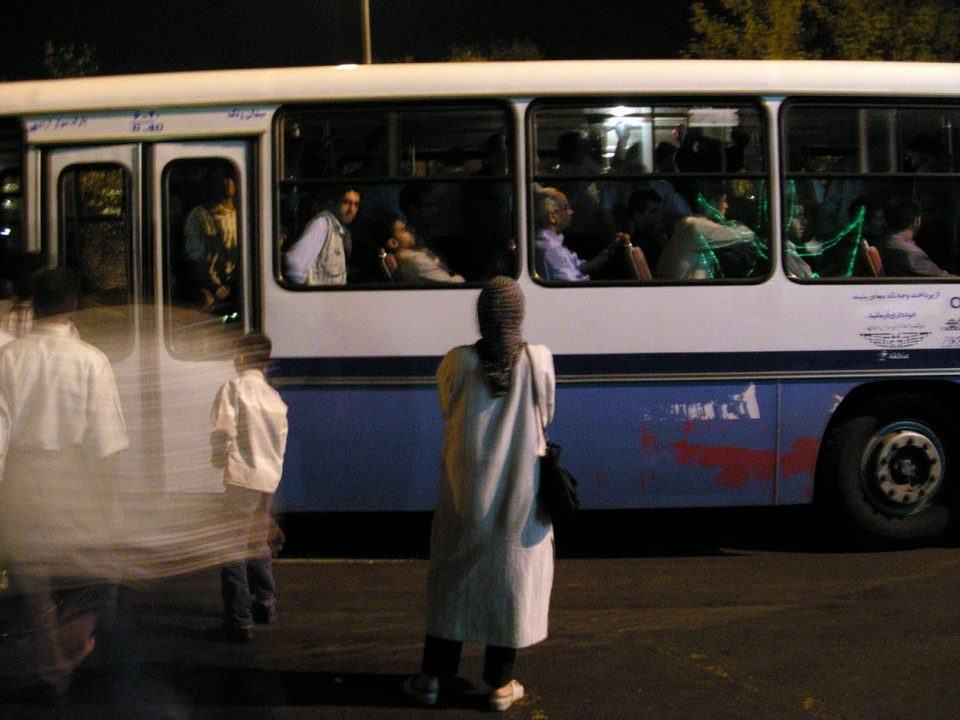
Iran Sanctions — More Pain, Less Gain?
August 12, 2013
What is the Green Movement Dreaming About?
August 26, 2013Arseh Sevom –For many civil society actors in Iran, the economic sanctions imposed by the United States and the international community have multiplied the hardships they face from their own antagonistic government. Sometimes it can feel as though all the doors around you find are locked. Over the past couple of weeks, a new sanctions have been imposed by the US congress. A group of political prisoners wrote an open letter to Barak Obama asking for an end to the sanctions. Iranians who want to study certain fields in the US have been met with closed doors due to the most recent round of sanctions. The costs of medications and medical treatments have soared over the past few years in Iran, while the value of the currency has plummeted. In an interesting development, confirmation hearings for President Rouhani’s cabinet nominees were broadcast on Iranian state television. Finally, Iran marks sixty years since a coup organized by the CIA and the British ousted Iran’s Prime Minister.
by Peyman Majidzadeh
Letter from Prison: Seeking Relief from behind the Bars
More than 50 political prisoners wrote an open letter to Barak Obama, asking him not to continue unfair sanctions against Iran, Radio Zamaneh [fa] reported. The authors argue that sanctions have been designed to weaken Iranian regime by putting pressure on Iranian people. They regard Rouhani’s victory in recent elections as an opportunity to build “positive change and mutual respect.” The political prisoners wrote:
The sanctions have now turned into a collective punishment imposed on the Iranian people as a whole, not the government only. The national economy has shrunk over the past couple of years and the strength of Iran as a nation-state is being reduced.
I can’t agree more, and I think Iranian people are with me on this. The letter was not written by the Iranian regime. It is the voice of opposition. The opposition inside Iran wants peaceful talks. The International Crisis Group [en] urges direct talks. Everyone wants talks. It seems that a consensus is being built. It is time to recognize that debilitating sanctions are not a viable solution.
Read the full letter translated into English here.
US Slams Doors in the Faces of Iranian Students
The Virtual Embassy of the United States, Tehran, Iran [fa] recently announced that the US will not issue visas for Iranian students who want to pursue their education in a number of fields including oil, natural gas, and nuclear energy. The report also states that students who want to study in other fields such as management or computer science and then use their knowledge to work in the above fields will also be rejected. Who judges a students’ intentions? There are always some guys!
The announcement refers to article 501 of the “Iran Threat Reduction and Syria Human Rights Act of 2012” [en] approved on the 10th of August 2012. Yes, there is an act with this exact name that gives American lawmakers a free hand to pose any sanction against Iran. Are the sanctions “smart?” Well, there are Sanctions Apps available for smartphones, which are quite informative!
Iran Economy: Ahmadinejad’s Dubious Legacy for Rouhani
According to Tribune Zamaneh [fa], the Iranian Economists Association wrote a letter to Hassan Rouhani to inform him of the nature of the legacy he is receiving from the administration of Ahmadinejad. The association, led by Ali Rashidi, mentioned factors such as a “the devaluation of the national currency…an actual inflation rate of above 40%” and “the disregard of statistics by a number of officials” as examples of the previous government’s mismanagement.
The World Bank announced Iran’s inflation rate in the year 2012 at 27.5 percent, which puts the country in the third worst place among all countries, Radio Zamaneh [fa] reported. However, many experts believe that Iran’s actual inflation rate is much higher, closer to the 42 percent Rouhani announced. Deutsche Welle [fa] also reported that some cities of Iran suffer from an unemployment rate of above 40 percent. Let’s wait and see what Rouhani can do with this unpleasant legacy.
Situation of Iranian Patients: Up in the Air
According to Kaleme [fa], 12 medical factories in Fars, Kerman and Kermanshah were nearly closed due to changes in rules and regulations. The changes made the export of medicinal plants almost impossible. In another report [fa], the website discusses significant increase in the price of some medicines and shortage of some others.
In a similar report, Deutsche Welle [fa] stated that radiology costs have increased 500 to 800 percent between the years 2004 to 2013. And now Rouhani’s administration should think of a serious solution for the country’s healthcare situation. Patients are in dire need of attention and practical policies to cope with the situation.
All the President’s Men
The Iranian parliament finished its protracted discussions on Rouhani’s suggested ministers and gave votes of confidence. The process of talking over the suggested ministers’ plans started on Monday 12 August. The results were announced after more than 36 hours of discussion during the final working hours of Thursday 15 August, ISNA [fa] reported. On Thursday, the parliament gave votes of confidence to 15 ministers and refrained from approving three –Jafar Mili-Monfared as Science, Research and Technology Minister, Mohammad Ali Najafi as Education and Training Minister, and Massoud Soltani-far as Sports and Youths Minister. See the full list of ministers and their votes here [en].
MP Fatemeh Rahbar said that the main reason for disqualification of these three ministers was their role in the 2009 “Sedition Current” [fa]. She said that the Principlist faction of the parliament held direct talks with the disqualified candidates who did not “clearly deny” their role in the “sedition.” It seems that the so-called Sedition Current is still a red line for Iranian regime.
The process of giving votes of confidence had positive aspects as well. For the first time, Iran’s national TV [fa], covered the process so that every Iranian people could follow it. This, of course, was a promising step forward. Needless to say, it was an eye opening experience for all Iranians to see their representatives in the parliament in action and get a sense of their attitudes and knowledge.
Back into the History: A Coup that Changed the World
Sixty years ago, on 15 August 1953, Iranians filled the streets to neutralize a coup that changed the history both in on a domestic and global level, Kaleme [fa] reported. The first attempt to conduct a coup d’etat against Mossadegh was unsuccessful and people left the streets joyfully, yet it worked in the second round. Three days later, the coup toppled Iran’s first democratically elected government (sounds familiar?) Years later, it was revealed that the coup was backed by U.S. and British intelligence agencies. It brought about similar U.S. operations to destabilize governments in 1950s. Some observers still regard this event as tragic and with profound influence on the future of the country and the world. It somehow paved the way for two political trends, radical Islamists led by Ayatollah Ruhollah Khomeini and radical leftists in the form of the militant Mujahedin-e Khalq. To gain ground in the decades after the coup. Iran, along with the whole Middle East, became the playground of Cold War lords. This particular coup fueled a lot of conflicts to come in Iran and the region.
Had the CIA and MI6 intelligence services not masterminded the coup, the courses of actions could have turned out so differently for Iran and the region.





